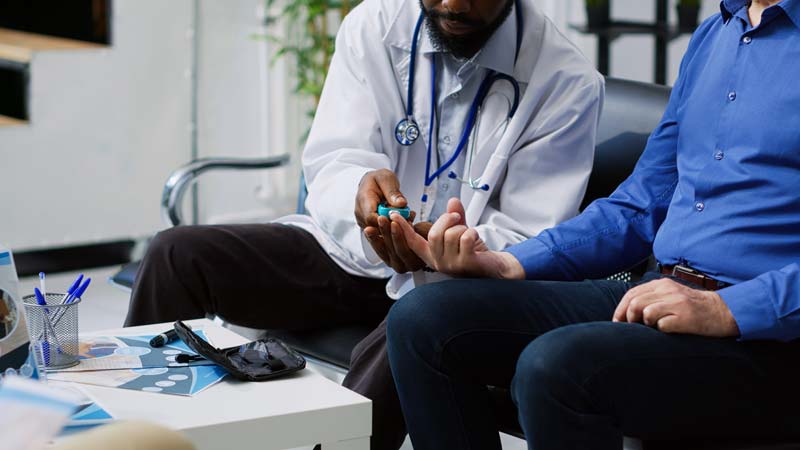
When it comes to sexual health, STD testing is a crucial aspect that should never be overlooked. Bridgeport, CT, a city of historical significance, also faces the challenges of STD prevalence. Exploring the subject thoroughly, this article emphasizes the importance of STD testing for couples, including same-sex partners, and highlights the significance of getting tested. Let’s understand the urgency of STD testing in Bridgeport, CT, and how it plays a pivotal role in safeguarding individual health and promoting a healthier community.

Engaging in sexual activity without using condoms or other barrier methods exposes individuals to a higher risk of acquiring STDs. Whether in casual encounters or long-term relationships, everyone needs to prioritize safe sex practices to protect their health and that of their partners.
Having multiple sexual partners without consistent and proper condom use escalates the likelihood of STD transmission. To safeguard their well-being, individuals with multiple partners are strongly advised to undergo regular STD testing in Bridgeport, CT, which helps detect infections early and promotes responsible sexual behavior.
The misuse of drugs, particularly injected drugs, is linked to an increased risk of STDs. Sharing needles and engaging in risky sexual behaviors while under the influence of substances can facilitate the spread of infections. It is crucial to address drug misuse and the importance of practicing safe sex.
Inadequate communication about sexual health among partners may lead to a lack of awareness about each other’s STD status. Open and honest discussions about sexual history and testing are fundamental in preventing the transmission of infections and promoting a culture of responsible sexual behavior and trust.
The emergence of drug-resistant strains of certain STDs presents significant challenges for healthcare providers. These resistant strains make treatment more difficult and highlight the importance of early detection through regular STD testing in Bridgeport, CT, while emphasizing the need for continuous research and innovative solutions in combating these infections.
The stigma associated with STDs can deter individuals from seeking testing and treatment. Reducing the stigma is essential to create an environment where people feel comfortable getting tested and seeking medical care when needed, promoting a proactive approach to managing their sexual health.
Socioeconomic factors may hinder access to healthcare services, including STD testing in Bridgeport, CT. Efforts to improve access, particularly in underserved communities, can play a vital role in early detection and prevention, ensuring everyone has equal opportunities to maintain their sexual health.
Some STDs may not exhibit noticeable or mild symptoms that individuals may overlook. This delay in diagnosis can lead to further transmission and complications, emphasizing the importance of routine STD testing as a proactive measure for maintaining sexual health.
Lack of awareness about the prevalence of STDs in Bridgeport may contribute to a false sense of security. Raising awareness through educational campaigns can help individuals understand the risks and the importance of regular testing, empowering them to make informed decisions about their sexual health.
Social and cultural shifts in sexual behavior can impact the spread of STDs. Keeping track of these changes and adapting prevention strategies is crucial for effective disease control, as it enables healthcare providers to tailor their approaches based on evolving patterns of sexual behavior.
For individuals who tested positive for an STD and received treatment, reinfection remains a concern. Reinfections can occur if sexual partners are not simultaneously treated or preventive measures are not consistently followed. Educating individuals on reinfection risks and emphasizing the significance of partner involvement in treatment can help reduce such occurrences.
Regular STD testing is a proactive approach to protect each partner’s health. By knowing their STD status, individuals can take appropriate measures to prevent the transmission of infections to their loved ones.
Routine testing allows for early detection of STDs, enabling timely treatment if infections are detected. Early intervention can prevent complications and mitigate the spread of infections to others.
Opting for STD testing together fosters open communication and trust within the relationship. It demonstrates a commitment to each other’s well-being and promotes a safe space to discuss sexual health matters.
By openly discussing and normalizing STD testing in Bridgeport, CT, couples reduce the stigma associated with sexually transmitted infections. This, in turn, encourages others in the community to prioritize testing and seek medical care without fear of judgment.
Some STDs can lead to fertility issues or complications during pregnancy if left untreated. Regular STD testing ensures couples can plan for their future with accurate information about their reproductive health.
By getting tested regularly, couples play a vital role in supporting community health. Responsible behavior within relationships helps prevent the spread of STDs and contributes to a healthier population.
Understanding each partner’s STD status allows couples to make informed decisions about their sexual activities and take appropriate precautions to reduce the risk of transmission.
Taking charge of one’s sexual health through regular STD testing empowers individuals to prioritize their well-being and encourages a sense of responsibility towards their health and that of their partner.
Discussing and addressing sexual health concerns can strengthen emotional intimacy between partners. By facing potential challenges together, couples can develop a deeper bond.
Couples prioritizing regular STD testing set a positive example for others in their social circles. Their proactive approach to sexual health can inspire friends and family members to follow suit, creating a ripple effect of responsible behavior.
Certain behaviors, such as multiple sexual partners or substance use, can heighten the risk of contracting STIs. Awareness of these risks is essential in promoting safer sexual practices within the LGBTQ+ community.
Encouraging open and honest communication about sexual health between same-sex partners is crucial. By discussing testing, previous sexual history, and safe sex practices, couples can strengthen their bond and jointly prioritize their well-being.
Public health campaigns tailored to the LGBTQ+ community can help disseminate information about the importance of STD testing in Bridgeport, CT, safer sex practices, and available resources. Increasing awareness will empower same-sex couples to make informed decisions about their sexual health.
Training healthcare providers to be culturally competent and sensitive to the needs of LGBTQ+ patients is essential. Creating a welcoming and accepting healthcare environment can positively impact regular testing and care engagement.
Collaborating with LGBTQ+ support organizations can facilitate outreach and testing initiatives within the community. These partnerships can help bridge gaps in healthcare access and promote STD prevention.
By fostering safe spaces within the community, same-sex couples can feel more comfortable discussing sexual health and accessing testing services without fear of discrimination.
Leveraging technology, such as telemedicine and online testing options, can improve accessibility to testing services, especially for individuals facing challenges accessing in-person care.
Recognizing the link between mental health and sexual health, Bridgeport should support mental health initiatives within the LGBTQ+ community. Addressing mental health concerns can positively impact overall well-being and encourage individuals to seek STD testing and preventive care.

Bridgeport’s public health clinics are essential resources for individuals seeking affordable and accessible STD testing in Bridgeport, CT. These clinics provide a wide range of services, including screenings for common sexually transmitted infections like chlamydia, gonorrhea, and syphilis. They may also offer testing for HIV and hepatitis. Public health clinics often prioritize confidentiality and support those hesitant about seeking testing.
Beyond public health clinics, Bridgeport boasts various community organizations focusing on sexual health. Some organizations may host periodic STD testing events or provide referrals to nearby clinics for testing services. They are crucial in raising awareness and providing resources for STD prevention and testing.
For individuals seeking personalized and comprehensive STD testing in Bridgeport, CT, private healthcare providers are an excellent option. Private clinics offer a wide range of testing services and often use the latest diagnostic technologies to ensure accurate results. These providers prioritize patient privacy and may offer same-day or walk-in appointments for added convenience.
Some testing facilities in Bridgeport offer anonymous STD testing in Bridgeport, CT, where individuals can get tested without providing personal information. Anonymous testing ensures confidentiality, which may be especially important for those concerned about privacy or potential stigma.
Bridgeport has health centers catering to the LGBTQ+ community. These centers offer inclusive and LGBTQ+-friendly environments, making them a comfortable choice for same-sex couples seeking STD testing in Bridgeport, CT. The staff at these centers are trained to provide culturally competent care and understand the unique needs of the LGBTQ+ population.
For students in Bridgeport, college and university health services often offer STD testing as part of their comprehensive healthcare offerings. These services are convenient for students and help promote sexual health awareness on campuses.
In the digital age, some providers offer online STD testing services. Individuals can order test kits online, collect their samples at home, and return them to the lab for analysis. Online testing may suit those who prefer a more discreet testing experience.
STD testing involves different methods depending on the type of infection being screened. The common types of tests include:
Blood tests detect infections like HIV, syphilis, and hepatitis. A small blood sample is usually taken from a vein in the arm for analysis.
Urine tests are commonly used to screen for infections like chlamydia and gonorrhea. Individuals provide a urine sample, which is then tested for the presence of the bacteria that cause these infections.
Swabs collect samples from specific body areas, such as the genital area, mouth, or rectum, depending on the tested infection. Swab tests often detect infections like herpes or human papillomavirus (HPV).
STD testing varies based on individual risk factors, lifestyle, and previous test results. Healthcare providers may recommend more frequent testing for individuals with multiple sexual partners, those who engage in high-risk behaviors, or individuals who have had unprotected sex.
In most cases, STD testing requires no special preparation. However, it is essential to discuss any symptoms, sexual history, or potential exposure to STDs with the healthcare provider before the test. This information helps the provider determine the most appropriate tests to administer.
STD testing in Bridgeport, CT, prioritizes patient confidentiality. Test results are usually kept confidential and shared only with the tested individuals. Healthcare providers and testing facilities follow strict privacy protocols to protect sensitive information.
Once the test results are available, the healthcare provider will explain the findings and their implications. The provider will discuss treatment options and preventive measures if the test results are positive for an infection. If the results are negative, the provider may still guide safe sex practices and encourage regular testing to maintain sexual health.
In cases where one partner tests positive for an STD, healthcare providers may encourage the individual to notify their sexual partners to seek testing and treatment. Partner notification is essential in preventing further transmission and supporting all individuals’ health.

In today’s world, many individuals feel a sense of embarrassment about getting tested for STDs. This feeling often stems from misconceptions that being tested means they are being careless or might be judged for their choices. This makes it hard for folks to take the right steps to stay healthy. It even stops some from going to the doctor or talking openly about it. But if we start discussing and correcting these mistaken ideas, more people might see that regular testing is important and take charge of their sexual health.
Creating an open dialogue about sexual health, and STD testing helps normalize the conversation. Public health campaigns, school programs, and community discussions can all contribute to reducing the stigma and encouraging candid conversations about sexual health.
Presenting STD testing as a routine part of responsible sexual health care can help destigmatize the process. Like regular medical check-ups, STD testing is a proactive measure to maintain well-being.
Adopting non-judgmental language in public health messaging and healthcare settings can make individuals feel more comfortable seeking testing. Creating safe spaces where people feel accepted and understood can break down the barriers of shame.
Recognizing and addressing the unique challenges faced by the LGBTQ+ community can help foster inclusivity. Tailoring education and testing resources to cater to the needs of LGBTQ+ individuals can create a more welcoming environment for everyone.
Challenging stereotypes associated with STDs can prevent further stigmatization. Emphasizing that anyone can contract an STD, regardless of age, gender, or background, promotes empathy and understanding.
Peer-led support groups and initiatives can provide a safe space for individuals to discuss their experiences and seek advice from others who have undergone testing. Peer support can help combat feelings of isolation and encourage individuals to take control of their sexual health.
Engaging healthcare providers to destigmatize STD testing in Bridgeport, CT, is essential. Training providers to offer compassionate, non-judgmental care can create a positive patient testing experience.
Changing cultural attitudes towards sexual health and STD testing in Bridgeport, CT, takes time but is crucial for long-term impact. Promoting acceptance and understanding through media, arts, and community events can influence societal norms.
Cost should not hinder STD testing in Bridgeport, CT. Bridgeport can work with public health agencies, community organizations, and healthcare providers to offer low-cost or free testing options, especially for those facing financial challenges.
Implementing sliding scale fees can make testing more affordable for individuals with varying income levels. By adjusting the cost of testing based on an individual’s ability to pay, more people can access the care they need.
Recognizing and respecting cultural differences is crucial in providing inclusive healthcare services. Training healthcare providers to offer culturally competent care ensures that individuals from diverse backgrounds feel comfortable seeking testing.
Language barriers should not hinder individuals from understanding the importance of STD testing in Bridgeport, CT. Providing multilingual educational materials and interpreters at testing facilities can facilitate communication and encourage more people to get tested.
To address transportation issues, Bridgeport can consider deploying mobile testing units that bring STD testing services directly to communities, schools, and neighborhoods. This mobile approach ensures broader accessibility, particularly for those with limited transportation options.
Offering flexible testing hours, including evenings and weekends, accommodates individuals with busy schedules. Convenient hours increase the likelihood of seeking testing without disrupting their daily responsibilities.
STD testing is crucial for overall health and well-being. All couples, including same-sex partners, should prioritize their sexual health. Bridgeport, CT, provides diverse testing options, and by overcoming barriers and stigmas, the community can work towards a healthier future. With STD testing results available in just 20 minutes, regular testing at Docs Primary Care – Bridgeport ensures that individuals and their partners are protected, fostering a healthier and more responsible community in Bridgeport, CT.
Visit us now for accessible and confidential STD testing, and take charge of your sexual health today!

During this surge in COVID-19 cases, our primary focus is meeting the high demand for tests, and we are seeing higher than usual wait times. This means we are unable to answer most phone calls. Please know that our teams are working very hard during this time to care for as many patients as safely as possible. Please click the button below for answers to common questions. We appreciate your understanding.